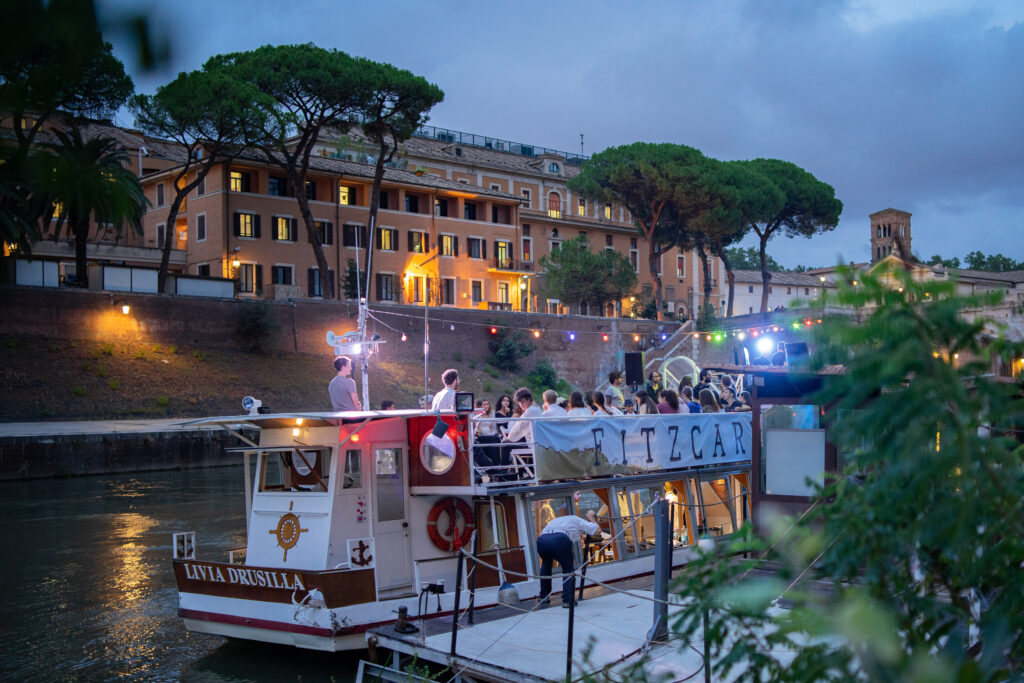
The experience
Welcome to the Fitzcarraldo Experience: a project by Dominio Pubblico that invites you to immerse yourself in a unique experience of contemporary opera through virtual reality.
Inspired by the opera “Fitzcarraldo: Opera Lirica su battello” produced by E45, this digital art adaptation allows you to experience the dreamlike journey of an opera set on the waters of the Tiber, between Tiber Island and the Ara Pacis.
Through the VR viewer, spectators will be able to virtually board the boat, enjoying the art and culture that come to life against the backdrop of eternal Rome. The Fitzcarraldo Experience was designed to make the exceptional atmosphere of the original opera accessible. This digital platform not only allows individual enjoyment, but has been designed for collective viewing events in theaters, museums and cultural centers, thus creating a new way of experiencing opera culture.
Discover how the world of tradition and innovation merge in this timeless experience, available to international audiences all year round, anywhere and anytime.
The opera
The protagonist, Fitzcarraldo, played by the baritone Giorgio Celenza, crosses the Tiber together with his art company, composed of the Actress, played by the soprano Clara La Licata, the Actor, brought on stage by the tenor Antonio Sapio and the Assistant Director, the bass Yuri Guerra. With them, the ensemble Musica Necessaria composed by Maestro Francesco Leineri himself, by Fabio Cuozzo on percussion and Luigi Ginesti on French horn, joined by La Cantoria of the Teatro dell’Opera di Roma, a twelve-member choir. The characters are filled with the off-screen voice of the Oracle, played by countertenor Antonello Dorigo.
The purpose of the journey, as in Herzog’s film, is Fitzcarraldo’s undertaking to build a new world that finds its element of salvation in art. The Opera narrates, in fact, the rehearsals for an opera show that, once the crossing is over, can only be performed in life.
The opera “Fitzcarraldo” is presented to the public on board a boat, an original moving stage among the unique views of the historic center of Rome, from Tiber Island to Castel Sant’Angelo. The protagonist Fitzcarraldo crosses the Tiber together with his art company composed of the first actress, the actor and the assistant director. Above them, in the distance, the off-screen voice of the Oracle, which prefigures a message that is gradually revealed to the listener. The instrumental ensemble, made up of synths and controllers for the electronic signal, of percussion instruments and French horn, accompany the verses that from the epic to the baroque form, from symbolism to contemporary language, restore that historical-cultural stratification typical of the city of Rome. The work is divided into five scenes introduced by the chorus that in Dantean meter supports the entire plot describing during the boat journey the ruins of the ancient city, the contemporary suburbs, Castel Sant’Angelo, the Maxxi and the bridge of a future civilization, as if it were a tourist guide who accompanies spectators on a visit to what remains of a post-modern world. The themes of the chorus are counterpointed by the characters of the work and Fitzcarraldo himself who little by little reveals his mission. The protagonist’s enterprise is to build a new reality that finds its element of salvation in art, recounting in the scene the rehearsals of an operatic show that once the journey is over can only be performed in life.
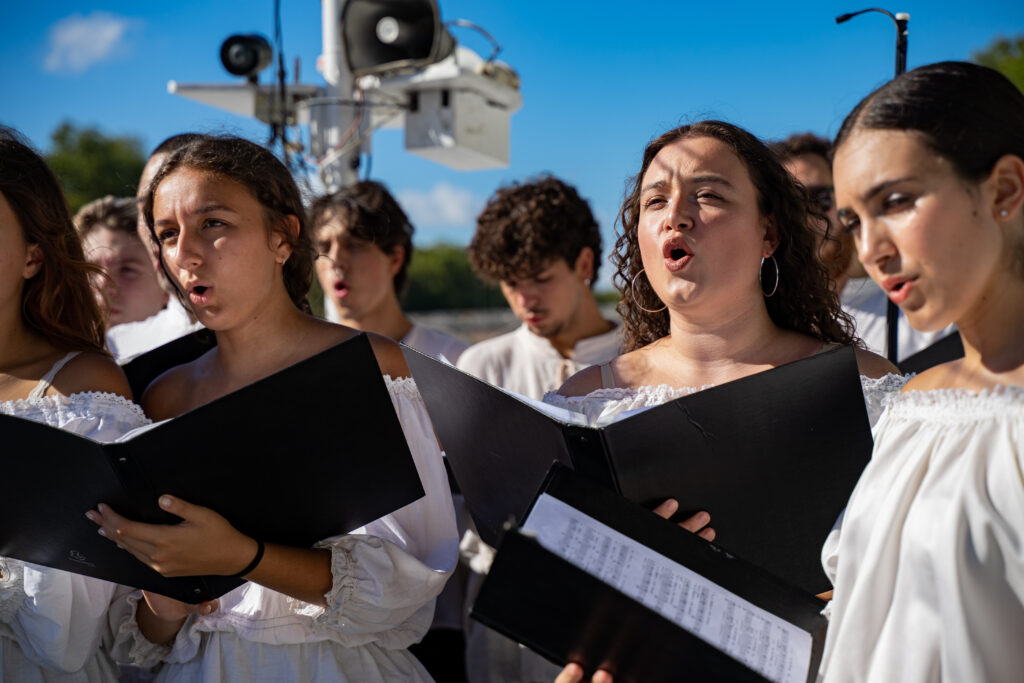
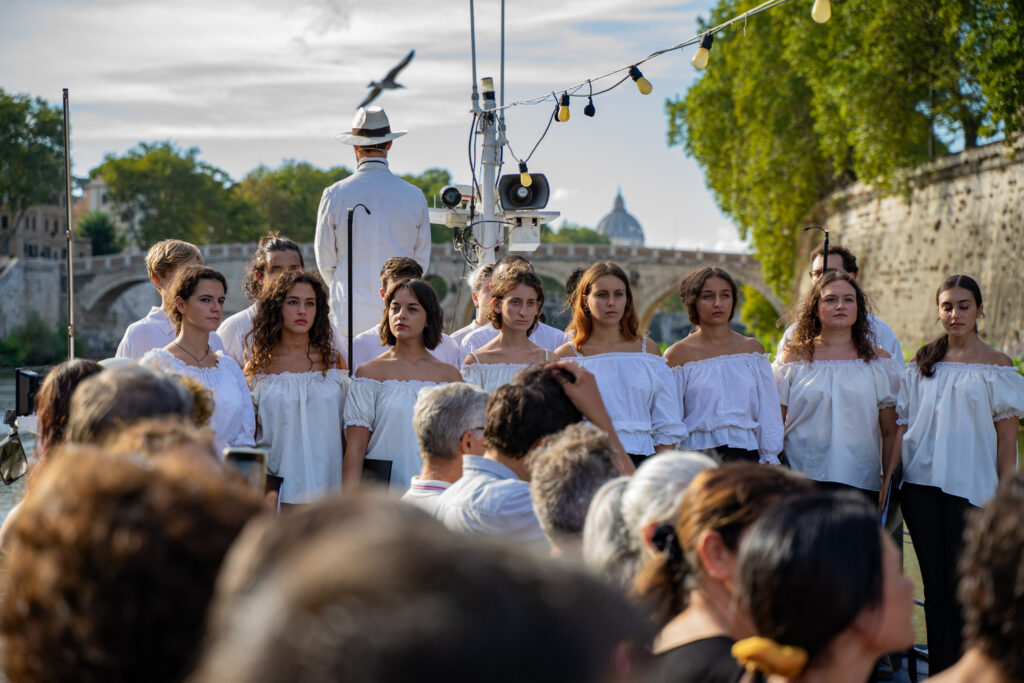
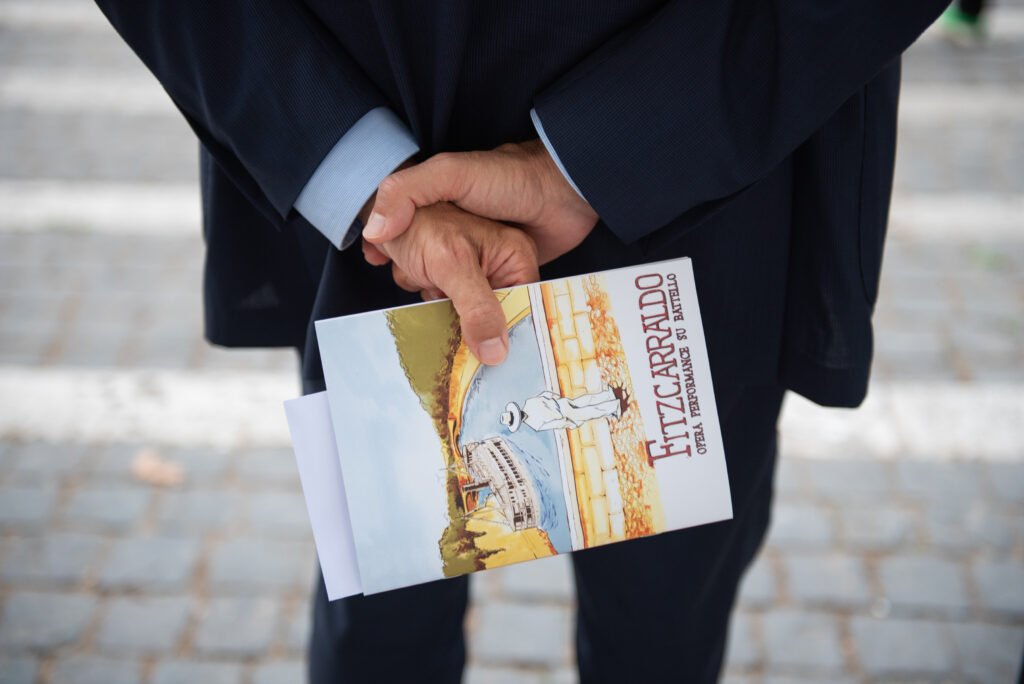
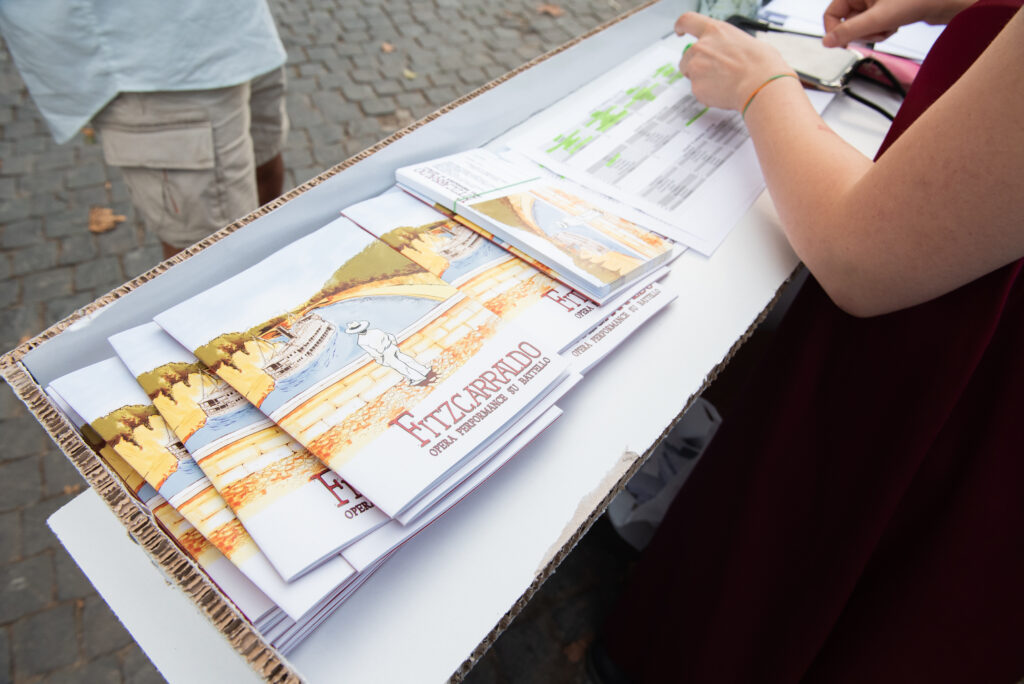
The Booklet
In the score of «Fitzcarraldo Opera Lirica su battello» the structural codes of the opera are markedly recalled, symbolically retaining its peculiarities and renewing them in a deliberately essential and contaminated writing. The instrumental ensemble that was chosen is reduced but clear in its atypicality, as in an ideal orchestra pit of a contemporary post-apocalyptic: synth and controller for the electronic signal, the rhythmic ancestry of the percussion instruments, the monodic lyricism of the French horn. The utopian search for the new world of Fitzcarraldo is also returned in the score in a mobile, chameleon-like approach to vocality: a parabola that goes from the spoken, passing through the psalmody and the mannered virtuosity, towards an essentiality as desert, empty but extremely pure at the same time. The composer, Francesco Leineri, worked on a constant flow of music, a macro-form with deliberately blurred and foggy boundaries, proceeding with a non-explicit division of the scenes, without rigorously juxtaposing the episodes, opting for a long and slow crossfade between them, as in a long dream.
In the score of «Fitzcarraldo Opera Lirica su battello» the structural codes of the opera are markedly recalled, symbolically retaining its peculiarities and renewing them in a deliberately essential and contaminated writing. The instrumental ensemble that was chosen is reduced but clear in its atypicality, as in an ideal orchestra pit of a contemporary post-apocalyptic: synth and controller for the electronic signal, the rhythmic ancestry of the percussion instruments, the monodic lyricism of the French horn. The utopian search for the new world of Fitzcarraldo is also returned in the score in a mobile, chameleon-like approach to vocality: a parable that goes from the spoken, passing through the psalmody and the mannered virtuosity, towards an essentiality as desert, empty but extremely pure at the same time. The composer, Francesco Leineri, worked on a constant flow of music, a macro-form with deliberately blurred and foggy boundaries, proceeding with a non-explicit division of the scenes, without rigorously juxtaposing the episodes, opting for a long and slow crossfade between them, as in a long dream.
The artists
Fabio Morgan (creator and artistic director)
Visionary, artistic entrepreneur, creator of cultural formats, he was the artistic director of the Teatro dell’Orologio until 2017, of the theatrical production Progetto Goldstein until 2020 and the founder of Velvet Movie with which he produced, among others, the documentary “Il Sogno di una cosa”. He co-founded the start-up Oniride, chosen to represent the excellence of the Lazio Region at Expo 2015 (Milan) with which he created “Walking on the Moon” the first theatrical show that uses virtual reality, making spectators “walk” on the Moon. Since 2017 he has been the creator and artistic director of La Città Ideale, a multidisciplinary festival of projects for urban spaces, where Morgan has developed innovative formats such as the first itinerant show between the stations of the Metro C and “I Nasoni Raccontano”, an urban storytelling project. In the midst of lockdown, he created the format “Teatro negli ATER” for its third edition in October 2022, when “Un giorno tutto questo niente sarà tuo” will debut, an adaptation of Accattone by Pier Paolo Pasolini made with the inhabitants of the ATER of Torrevecchia.
Francesco Leineri (compositor)
Composer graduated from the Santa Cecilia Conservatory in Rome under the guidance of Maestro Matteo D’Amico. His repertoire is attentive to the connections between music and words in the field of music applied to performance (opera, theater and visual arts) and his language has always been connected to the narration of stories. His works have been performed in Italy (Auditorium Parco della Musica in Rome; Accademia Filarmonica Romana; PIF 2014, Castelfidardo; MUST Milan), France (Theatre de Verre, Paris), Germany (UWE – der festival 2016, Monaco), Czech Republic (Setkani-Encounter 2016, Brno), Switzerland (Teatro La Darsena, Lugano), California (Spreckels Theatre, San Diego Fringe Festival 2015), Mexico (Estacion Teatro, Tijuana), India (ITFOK 2017, Thrissur) and Ecuador (Encuentro de los Andes 2013, Riobamba). His scores are published by Ermes404 editions.
Andrea Carvelli (librettist)
Playwright and poet, he collaborated with the CK Teatro company, of the Teatro dell’Orologio in Rome, with which he created the verse shows “Being Hamlet” and “Superstar”, directed by Fabio Morgan. He is the author of “Pinocchieide” and “Woyzeck-Machine”, poetic adaptations of the literary works of the same name. He has collaborated with literary magazines in the sector and some poems have been collected in a collective volume published by Orizzonti. In 2022, his first book of poetry entitled “Epitaffi” was published by the publishing house L’Erudita della Giulio Perrone Editore.